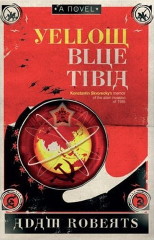Inauthenticity
 Author Catherynne M. Valente has just finished reading Yellow Blue Tibia by Adam Roberts, and she’s pissed off. “[L]iterally every cultural note in this entire novel is wrong,” she writes (her emphasis), and goes on to explain why, in telling and damning detail. Roberts, she argues, gets everything about Russia, Russians and Russian culture wrong (“the book would have been a lot more believable with all the names changed and set in England or America”). And, to top it all off, he gets a lot about the 1980s wrong, too: “One of the characters, Saltykov, has Asperger’s Syndrome. In 1986. Asperger’s was not diagnosed by that name in anyone until 1992. … Scientology and Asperger’s and alcoholism and the evils of tobacco are concerns of today, not of 1986.” Even the novel’s title, which is claimed to be a phonetic representation of saying “I love you” — that’s wrong, too.
Author Catherynne M. Valente has just finished reading Yellow Blue Tibia by Adam Roberts, and she’s pissed off. “[L]iterally every cultural note in this entire novel is wrong,” she writes (her emphasis), and goes on to explain why, in telling and damning detail. Roberts, she argues, gets everything about Russia, Russians and Russian culture wrong (“the book would have been a lot more believable with all the names changed and set in England or America”). And, to top it all off, he gets a lot about the 1980s wrong, too: “One of the characters, Saltykov, has Asperger’s Syndrome. In 1986. Asperger’s was not diagnosed by that name in anyone until 1992. … Scientology and Asperger’s and alcoholism and the evils of tobacco are concerns of today, not of 1986.” Even the novel’s title, which is claimed to be a phonetic representation of saying “I love you” — that’s wrong, too.
It’s annoying for a reader who knows something about the subject matter to come across a work that is so egregiously wrong about it. It’s why writers worth their salt do their research. They have to, because there are too many people out there who can and will fact-check their lazy asses and call them out on it. Valente, a writer very much worth her salt, definitely does her research, and has been doing her research vis-à-vis Russia, and it’s obvious that she’s annoyed that another writer doesn’t seem to think it matters.
I’m an historian by training; of course I think research matters. When I set myself to writing a story, I assign myself so much research that you’d think I was writing a refereed journal article, not a fantasy or science fiction novelette. I kind of overdo it, but I can’t help it: I’ve been hard-wired. And when I finally get these damn stories written, I hope it shows.
It matters even more when you’re writing about a culture that isn’t yours. If you’re going to muck around in somebody else’s culture, be a dear and at least try to get it right. (Apropos of which, see Norman Spinrad’s books column in the just-arrived April/May 2010 Asimov’s, wherein he looks at SF novels set in the quote-unquote Third World written by authors in the quote-unquote First.)
On the other hand, if you won’t try to get things right, at least have the good manners to go totally over the top. No one is going to fault Monty Python for historical inaccuracy in its movies. (“I have it on good authority that there was no such Roman as Biggus Dickus. And there is no evidence for a religious relic called the Holy Hand Grenade!”) Nor is there much point in going after Yahoo Serious’s Young Einstein (1988) because Einstein was not the son of a Tasmanian apple farmer. (Well, duh.) From the movie’s Wikipedia entry:
In this movie, Einstein splits a beer atom (with a chisel) in order to add bubbles to beer, discovers the theory of relativity and travels to Sydney to patent it. Here he invents the electric guitar and surfing, while romancing Marie Curie, who was in fact much older at the time and married. He invents rock and roll and uses it to save the world from being destroyed due to mis-use of a nuclear reactor under the watching eye of Charles Darwin, who had in fact died in 1882. The rest of the movie is somewhat less historically correct. [My emphasis.]
Of course, if the history and culture is something I know something about, I might have a different tolerance level. In that vein, I’m still trying to make sense of Tarantino’s Inglourious Basterds, which is gloriously ahistorical, but, since it covers a period I’ve studied intensely, I can’t help but be jarred by little details, here and there. For example, I know exactly how many times Hitler visited Paris: once, in 1940. I also know that French adults don’t, as a rule, drink milk. If Tarantino is going to make a big deal over how Germans show three with fingers, these and other details are incongruous. It’s a crazy fantasy universe, to be sure, but why be so egregious when you don’t have to be?